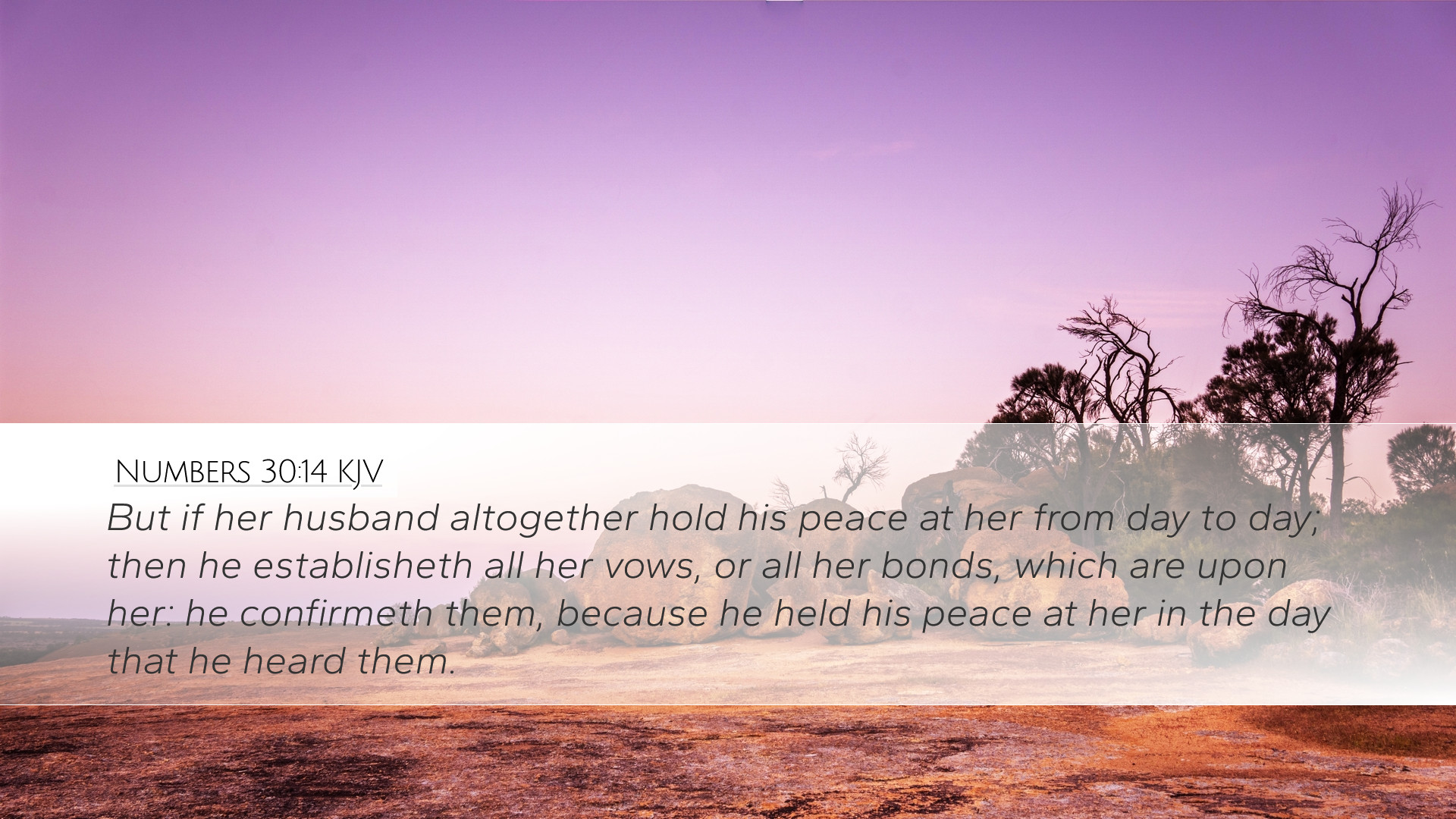Commentary on Numbers 30:14
Numbers 30:14 states, "But if her husband disallowed her on the day that he heard it; then he shall make her vow which she vowed, and that which she uttered with her lips, wherewith she bound her soul of none effect: and the LORD shall forgive her." This verse addresses the significant role of a husband's authority over his wife's vows and commitments within the context of ancient Israel. A comprehensive examination reveals several layers of theological, social, and moral implications that are vital for understanding the scriptural text.
Overview
This passage is embedded within the broader narrative of the Israelite community's legal and moral framework as detailed in the Book of Numbers. The laws surrounding vows are significant in establishing the gravity of spoken commitments in God’s covenant community.
The Authority of the Husband
Matthew Henry highlights the authority given to the husband as a means of ensuring marital harmony and responsibility. This reflects a structured familial order, which the Lord instituted for the well-being and accountability of individuals within the community. The husband’s ability to disallow his wife's vow underscores the significance of unity and mutual respect in the marriage relationship.
Albert Barnes adds that this authority should not be viewed as oppressive. Instead, it illustrates the need for a couple to collaborate spiritually and emotionally. While a wife’s commitment holds weight, her husband’s role is to guide her, helping to discern the best spiritual path forward for their family.
The Implications of Disallowing Vows
In this verse, the action of disallowing a vow indicates a form of mediation, where the husband serves as both a protector and a guide. Adam Clarke points out that the husband’s authority is intended for his wife’s welfare, ensuring that her vows do not lead her into unnecessary hardship or commitments that conflict with familial duties. Thus, a balance is observed between individual commitment and collective responsibility.
Application in Modern Context
This biblical principle can provoke thoughtful discussion in contemporary contexts regarding marriage and authority. Pastors and theologians can interpret this passage as a call to cultivate a relationship grounded in mutual respect and spiritual discernment. The discussion invites couples to engage in regular communication and decision-making that honors their commitments to God and one another.
- Spiritual Leadership: Husbands are called to exercise their authority responsibly, ensuring it is rooted in love and respect.
- Mutual Accountability: Wives are encouraged to share their spiritual commitments and seek guidance from their husbands, fostering a collaborative approach.
- Practical Implications: Recognizing the weight of promises made—both personally and in community—highlights the importance of thoughtful communication.
The Lord’s Forgiveness
The concluding phrase, "and the LORD shall forgive her," carries profound theological significance. Matthew Henry asserts that God's grace extends to individuals even when they don’t fulfill their vows due to circumstances beyond their control, such as a husband’s disallowance. This aspect of divine forgiveness emphasizes God’s understanding of human relationships and the complexities they entail.
Albert Barnes notes that this forgiveness serves not only as relief but as an invitation for restoration with God. It highlights that God desires a relationship of grace rather than mere legalism, allowing believers the freedom to live in the complexities of human relationships while remaining under His covenant love.
Conclusion
In summary, Numbers 30:14 opens rich avenues for exploration regarding the nature of vows, marital authority, and divine forgiveness. For pastors, students, and theologians, this passage demands a nuanced understanding of relationships within the covenant community. The interplay of authority, responsibility, and grace challenges believers to navigate their commitments thoughtfully, always under the overarching love and forgiveness of God. Through reflection on this text, individuals are called to a higher standard of accountability not only to one another but also to God Himself.


